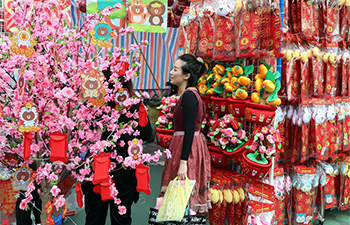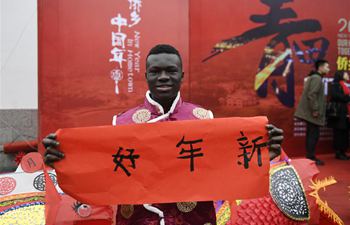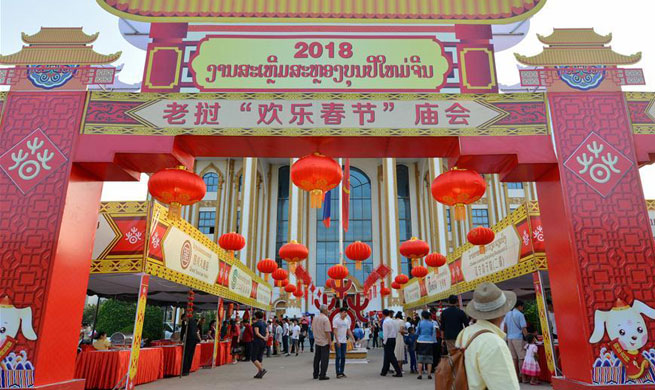CHANGSHA, Feb. 11 (Xinhua) -- On Mount Chuanyan, there sits a cabin. Inside the cabin is a simple bed, a table, some bacon hanging from the roof, and a man, Chen Liming.
Chen, 56, is a legend among locals. He was chairman of a Shenzhen Stock Exchange-listed company and twice on the Hurun Chinese Rich List. In 2013, he surprised everyone by stepping down from his post and returning to remote, impoverished Xupu County in southwest China's Hunan Province.
"I am deeply moved by the desperate poverty and amazing scenery here," said Chen, a native of Xupu.
Chen established a tour company and revived traditions such as drum performances, puppet shows, and lantern making. He financed 20 km of road to enable tourists to visit and admire magnificent views of the terrace fields in spring.
Over the past three years, more than 1,800 residents previously living under the poverty line have made a total of 68 million yuan (11 million U.S. dollars) working for Chen.
Chen has become an influential figure. His reputation, dedication, and charisma have made him a model resident, a role believed to be key to the development of rural China.
Chen represents a new generation of "xiangxian," which translates as "the rural virtuous." He is active in public affairs and mediating disputes.
Xiangxian have been important throughout Chinese history, in stressing the rule of virtue in governing. They are usually wise, well-educated, successful in business, and play an important part in preserving order and traditional values.
Many have also invested in the construction and development of their hometowns, and from this they have gained reputation and social status.
Xiangxian had almost disappeared in China for decades under the planned economy, when private wealth was scarce and government controls almost all resources.
As China embraces market economy, private wealth has seen explosive growth and social values are increasingly diversified. The government also encourages rural autonomy.
The "No. 1 Central Document" issued recently called for an active role for the new generation of xiangxian in rural revitalization, a concept proposed in a report delivered to the 19th National Congress of the CPC.
The new generation of xiangxian includes retired officials, entrepreneurs, highly-respected grassroots cadres, and teachers. They are familiar with local affairs and people, and can play a role where officials could not.
"Xiangxian are often deeply rooted in a region and have a strong power in persuading and educating locals," said Wang Quanzhou, an official in Shangqiu, central China's Henan Province. "In the countryside, where dealing with interpersonal relations is complicated yet vital in maintaining stability and boosting development, their roles must be highlighted."
Xiangxian can become an important supplement to the administrative system in the countryside, according to Hu Binbin, head of the Research Center of Chinese Village Culture at Central South University.
"They represent an auxiliary force in the protection of traditional villages and can become a leader in pushing forward the development of promising industries in a region," Hu said.

















